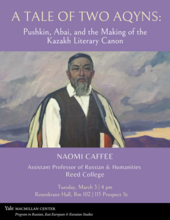The poet Abai Qunanbaiuli (1845–1904) today enjoys a dual legacy as the father of modern Kazakh literature (as distinct from its oral tradition) and also as an enlightener who translated the Russian classics into Kazakh and acted as a vital bridge between the two cultures. Much of Abai’s contemporary reputation owes its existence to the twentieth-century author, critic, and scholar Mukhtar Auezov (1897-1961), whose biographical writings on the poet formed the standard narrative of his life and work. Initiated in 1937, at the height of the Stalinist purges, Auezov’s literary canonization of Abai hinges on the poet’s acquisition of the Russian language and his transformative encounters with Russian-language texts. In Auezov’s account, Abai’s immersion in the Russian tradition led him to discover an authentically Kazakh literary voice, heralded by his successful adaptation of Alexander Pushkin’s Evgenii Onegin into traditional Kazakh song form. In analyzing this prominent episode of the Abai legend, in which Pushkin’s heroine Tatiana famously “sang out across the steppe” in the Kazakh language, I argue that the relationship between Pushkin, Abai, and their respective literary canons cannot be fully explained in terms of Russian conquest or Soviet ideological mandates. Instead, what emerges is a multifaceted and multigenerational dialogue between Moscow and the steppe, in which Kazakh writers laid the foundation for a national literary tradition in part by reading, translating, displacing, domesticating, and “disorienting” the figure of Pushkin.

A Tale of Two Aqyns: Pushkin, Abai, and the Making of the Kazakh Literary Canon
Event time:
Tuesday, March 3, 2020 - 11:00am to 12:30pm
Location:
Rosenkranz Hall
115 Prospect Street
false
06511
New Haven
, CT
See map: Google Maps
Connecticut
Speaker/Performer:
Naomi Caffee, Assistant Professor of Russian and Humanities, Reed College
Event description:

